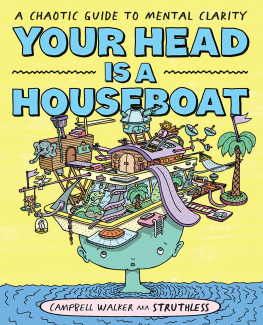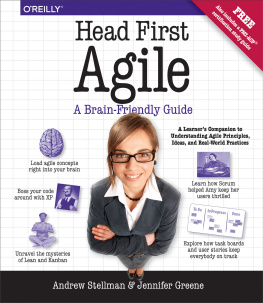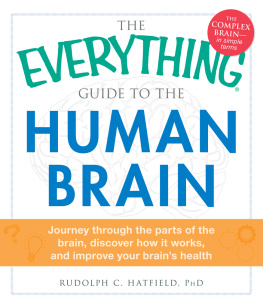
As a clinical psychologist and mindfulness practitioner, one of the most important pieces of advice Ive shared with clients is to stop believing everything you think. The idea that thoughts arent facts is a simple but profound concept and Ive seen it change peoples lives.
When youre able to step back and observe the relentless noise in your own head with an attitude of detached curiosity, your mood and behaviour will no longer be hijacked every time youre gripped by a random thought. With this newfound distance between you and the contents of your own mind, youre free to create a new relationship with the complex and often contradictory characters and places in your head.
Campbell Walkers houseboat is the perfect vehicle to help you do that.
The use of metaphors to support learning has been proven to improve retention in the short and long term, so not only do I expect you to thoroughly enjoy getting to know the people and places on your houseboat, but I have no doubt the lessons you learn about human psychology and how to gain freedom from emotional struggles will be deep and lasting.
Enjoy the ride.
Cassandra Dunn
Clinical & Coaching Psychologist

DISCLAIMER
The purpose of this book is to help you create mental clarity. Its a compassionate look at your brain through a very imaginative lens. Given the nature of this lens, Ive milked my creative licence to make many obscure analogies to describe brain functions. This book is not a scientific report of brain function but rather a framework for observing metacognition.
Its important to note that the metaphors and journalling techniques in this book are just whats worked for me. Im not an expert with all the answers, but a permanent work-in-progress with methods that have passed a focus group of one, so take everything with a grain of Himalayan pink salt. The exact imagery and questions in this book might not resonate with you, but the semantics arent as important as grasping the underlying principle of introspection and its ability to help you love yourself.
While this book serves as no replacement for therapy, it certainly serves as a supplement: an additional practice you can add to your life to make your houseboat a little bit nicer.



Good stuff goes into your head, like the smell of rain hitting a hot tar road: the scent of suburban summer makes you sentimental for stormy schooldays and youre hit with a key bump of nostalgia.

Bad stuff goes in to your head too: you see a juicy war in a comment section and you read every word, slur and misspelt death threat. Eighty-six comments later you feel broken and bitter, marvelling at just how far humans havent come.

The day-to-day stuff goes in, and often competes for brain space. You said youd help your sister move next Saturday, which is precisely when your friend is hosting their annual boozy brunch murder mystery. Plus, you accidentally said yes to dressing up as the Gift-Giving Holiday Wallaby for your works non-denominational end-of-year office party, and Saturday is your only day to source a costume.

Administrative stuff goes in. Your once-reliable car broke down last week and has since become a very reliable paperweight.

Youll deal with that, but first youll have to address the fact that, in an almost comical twist of events, your kid bit a dog. The dog owner is now demanding that your barely literate toddler writes a letter of apology to Mr Pickles.

When those two obligations give your brain a rest, you can finally get back to thinking about that lump on the back of your neck the one that your partner said was nothing, but WebMD has confirmed is most definitely a tumour.

You need a break, but the twenty-first century has other plans. All this stuff is going into your head in the most stuff-heavy context our species has ever known: the internet age.
Our brains are the canaries in the coal mine, testing how much data our descendants can or should consume. Were yet to see the long-term effects of all this input, and so internet consumption grows exponentially. The amount of data humans generated in the year 2000 will be the amount of data humans in 2025 generate every nine minutes.

Every single day we publish 500 million tweets, send 294 billion emails, upload 95 million Instagram posts and post 82 years of YouTube videos.
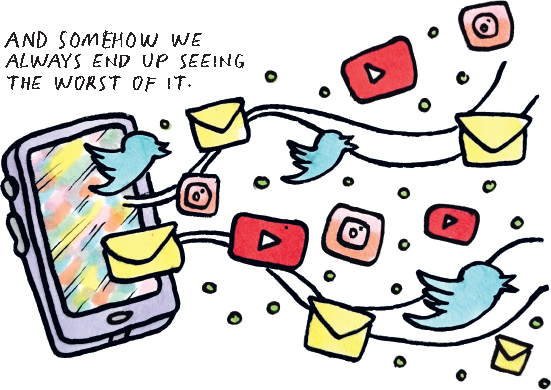
Online, you endure the millions of people posting their best lives. As the people around you perfect the art of PR, you turn your sights to PI. The first case to solve is how a family of five can afford to travel for eight months of the year, while you toil away hoping for a half-day off. You wade through the muck of Luxury Yacht TikTok tours, spammy Lambo Grams and beauty-intensifying Snapchat filters bound to induce some of that trademark internet body dysmorphia. No answers there either.

A quick scroll will show you a world where legitimate news outlets use clickbait headlines for ad revenue, where old high-school friends become life-coach-slash-real-estate-agents on Instagram, and where anonymous writers produce erotic fanfiction about Goku and Anne Frank.
And its all competing for your attention.
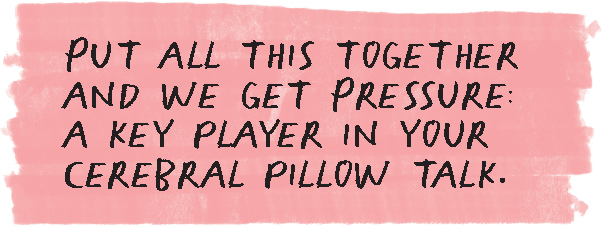
Theres the constant pressure to stay healthy and fit, which youve begun to suspect is a government conspiracy to sell activewear and kale.
Next page
